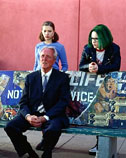
Movie Guru Rating:

Comment
on this review
| |

In Ghost World, freaks and weirdos come to terms with life
by Jesse Fox Mayshark
On the surface, this might not seem an auspicious time for a movie like Ghost World. This is, after all, a film about alienated teenagers who tell each other to "f—- off" as casually as they say hello and rarely have anything good to say about anyone. The tagline on the posters says "Accentuate the negative," which sounded a lot more clever a month ago than it does now.
But that tagline is ironic, and it's one of the only ironic things about this purposefully heartfelt movie. The film undercuts its superficial cynicism with a low-key combination of intelligence, sophistication and warmth that sets it apart from indie hipsterism as much as from Hollywood dross. For all its offhand ennui and anomie, Ghost World is one of the most hopeful movies I've seen in ages.
On a plot level, nothing too dramatic happens. It begins with best friends Enid (Thora Birch) and Rebecca (Scarlett Johannson) graduating from a non-descript Los Angeles high school. Exiting the ceremony, still clad in graduation gowns, both girls turn and thrust defiant middle fingers back at their educational institution. And it quickly becomes apparent that school isn't the only thing they dislike. They're a pair of brainy misfits, too cool to care much about things like grades and college, too smart to care about much of anything else. They'd like to have boyfriends, but most of the boys they meet are dorks, dummies or both.
Enid, the movie's central focus, is especially frustrated. A would-be rebel, she can't find any cause worth standing up for or any rebellious gesture that isn't pre-packaged. At one point, she dyes her hair green only to have a comic-book-store guy mock her for being a passé punk. She tries to argue that she's actually making a comment on the inevitable commodification of all individual expression, but you can tell the jab hurts; in the next scene, she dyes her hair back to black.
The film follows Enid, Rebecca and their small (very small) circle of acquaintances through the summer. Rebecca gets a job and starts thinking it might be nice to have plans for the future, a notion Enid passive-aggressively resists. Enid's mild and hopelessly geeky dad rekindles an old relationship with a woman Enid can't stand. And the increasingly isolated Enid drifts into a vaguely defined friendship with a nerdy, middle-aged record collector named Seymour (Steve Buscemi, in a role he was born for).
The film's strength comes from a powerful combination of maturity and youthful indiscretion. The former is courtesy of director Terry Zwigoff and co-writer Daniel Clowes, both of them a good deal older than the film's teenage protagonist. Zwigoff is a hip Baby Boomer fuddy-duddy, the director of the documentary Crumb! and friend to numerous luminarious oddballs of his generation (including, of course, underground comix pioneer R. Crumb). Clowes is a cultural heir to Crumb, a comics artist and author whose emotionally tangled 'zines and graphic novels include Ghost World, on which the movie is based. Their understanding of the awkward souls at the center of the film is entirely organic—Zwigoff, himself a collector of obscure 78s, is the acknowledged model for Seymour, and Clowes effectively translates to the screenplay the sympathy and grasp of his characters that informed the original comic book.
Still, it takes Birch to make the movie work. She turns Enid from someone's ideal of teen female angst into the real thing. From her chunky black army boots to her pale green lipstick, from her perfectly timed eye rolls to the way she jumps around her bedroom listening to the Buzzcocks, all the details feel right. As becomes clear from her constant makeovers (sorting through Enid's stuff, Rebecca comes across a black veil and says knowingly, "Oh, this was from your little-old-lady phase"), Enid doesn't know yet who she is. She's defined herself as a series of negatives, things she doesn't want to be—not boring, not phony, not perky, not professional, not "normal" in any of the ways she sees around her. When she visits the Starbucks-style coffee shop where Rebecca works, she's dismayed at the way her friend scorns some of the shop's cantankerous clientele. "Just wait until you get a job," Rebecca says, "you'll get tired of the losers, freaks and weirdos." "But," Enid replies with alarm, "those are our people."
Ghost World, being made by misfits as much as for or about them, has its share of self-indulgences and misfires. Some of the jokes about record geeks and whether comic books are really art are insiderish and needlessly defensive. On the other hand, if Zwigoff and Clowes didn't feel defensive about collecting records and drawing comics, they probably wouldn't have made the movie in the first place.
The ending to a film like this is always a tricky proposition. Having given us characters to care about in a world that doesn't really appreciate them, it's inevitably tempting to either dash them against the rocks or concoct an unlikely happy ending. Fortunately, the film does neither. It concludes at a point that feels more like an intermission than a finale, leaving the audience to spin out the rest of the story in our heads. And in doing so, it guarantees its characters something more than most films do: a future.

September 27, 2001 * Vol. 11, No. 39
© 2000 Metro Pulse
|